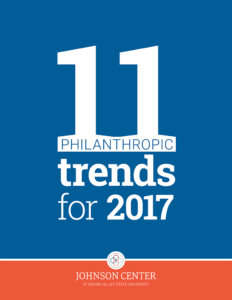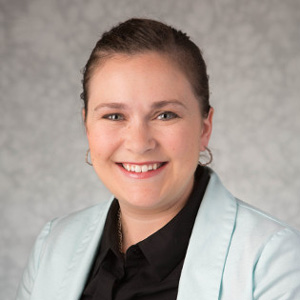Funders and Nonprofits Show Increased Focus on Data and Measurable Progress


Download and read the full report, featuring all 11 trends, here.
 While data are ever present in the hearts and minds of the staff of the Johnson Center, the sector has seen a renewed focus in the last year. Recent issues of The Chronicle of Philanthropy (e.g., Wallace, 2016; Wallace, 2016; Stiffman, 2015) have highlighted how fundraisers are utilizing data to understand what donors want, as well as how funders need to place higher data demands on nonprofits to ensure their funds are resulting in measurable progress.
While data are ever present in the hearts and minds of the staff of the Johnson Center, the sector has seen a renewed focus in the last year. Recent issues of The Chronicle of Philanthropy (e.g., Wallace, 2016; Wallace, 2016; Stiffman, 2015) have highlighted how fundraisers are utilizing data to understand what donors want, as well as how funders need to place higher data demands on nonprofits to ensure their funds are resulting in measurable progress.
While we believe that data lead to information that can empower nonprofits and funders to increase their impact, there are several important areas of caution. There must be a continued emphasis on funder-nonprofit relationships, with special attention paid to the creation of shared learning. Resource-scarce nonprofits often feel pressure to only report good news to funders. The increased pressure for data without co-occurring funding for capacity building runs the risk of leading to nonprofits collecting data with poor fidelity or where outcomes and indicators do not match up to activities, resulting in an inability to show measurable progress even when it exists.
Additionally, as the push for measurable progress increases and nonprofits begin collecting more data, they may learn that aspects of their programming that they previously believed to be impactful need tweaking. Often results may be too distal or long term to be amenable to reporting in an annual grant report. This runs the risk of encouraging nonprofits to shrink programming to only that which is measurable in a short time frame in an effort to ensure positive results and better secure future funding. It is important to maintain a focus on feasibility and incremental progress in the effort to increase data availability for decision making.

Wallace, N. (April 2016). Data to the rescue: Smart ways of doing good. The Chronicle of Philanthropy.
Wallace, N. (April, 2016). How to cross the data divide. The Chronicle of Philanthropy.
Stiffman, E. (January, 2016). What foundations want from grantee evaluations. The Chronicle of Philanthropy.